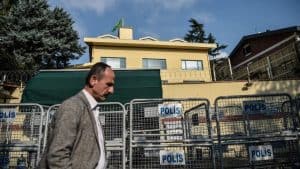
Saudi consulate in Istanbul, in which Muslim Brotherhood propagandist Jamal Khashoggi reportedly met his death (photo AFP)
“Politics ain’t beanbag,” as the saying goes, and that goes especially for Mideast politics, where terrorism and murder of opponents are the coin of the realm. Saudi citizen, journalist, Muslim Brotherhood member and its leading propagandist Jamal (“James”) Khashoggi knew this well. He reportedly gave his cell phone to his fiancee waiting outside, set his Apple Watch to “on,” and then hesitantly entered the Saudi Consulate General in Istanbul, never to emerge alive again. The Muslim Brotherhood is regarded by many as a terrorist organization. The Saudi government, like Egypt’s, believes the Brotherhood is seeking its violent overthrow.
Most of the US press, especially the left-wing press, is demanding that the US take strong retaliatory action against Saudi Arabia. The press’s motives seem predominantly to embarrass President Trump, who has forged close relations with the Saudi regime.
When the US and its key allies were highly dependent on Mideast oil, this country had no choice but to be an active player in Mideast politics and to not be overly fussy in its choice of allies. While the former oil-driven imperatives of US policy are no longer so pressing — oil sources elsewhere have become available, including in the US itself — it’s not exactly the case that the US can pack up its bags and go home. The US is a key, if somewhat diminished, offshore balancer in the region, necessary to ensure that no one country or alliance succeeds in overpowering all the rest and thus putting this still important oil source and gateway between Europe and Asia under its thumb.
Saudi Arabia and Israel play a key role as US allies to prevent the region from becoming dominated by a hostile Russian-Syrian-Iranian axis, likely soon to be joined by China. A further complication is the positioning of quasi-US-allies Turkey and Qatar in the Iranian-Muslim Brotherhood camp.
For this reason we wholeheartedly endorse Matthew Continetti’s call for prudence in the Washington Free Beacon (also featured in the National Review).
Important relations with both Saudi Arabia and often-hostile NATO member Turkey give the US good reason to just let the two players immediately concerned — Turkey and Saudi Arabia — handle this affair with minimal US entanglement.
The Khashoggi family has deep roots in Saudi Arabia and to some extent in US intelligence and European jet set circles. According to Wikipedia, in a hesitantly sourced article, Jamal Khashoggi’s “grandfather, Muhammad Khashoggi…served as personal physician to King Abdulaziz Al Saud, the founder of the kingdom of Saudi Arabia. Jamal Khashoggi is the nephew of late, high-profile Saudi arms dealer Adnan Khashoggi, known for his part in the Iran-Contra scandal, estimated to have had a net worth of $4 bn in the 1980s…. Jamal Khashoggi’s cousin, Dodi Fayed, was dating Britain’s Princess Diana when the two were killed in a car crash in Paris.”
Adnan Khashoggi was well known to President Trump. “[Adnan’s] yacht, the Nabila, was the largest in the world at the time and was used in the James Bond film Never Say Never Again. After Khashoggi ran into financial problems he sold the yacht to the Sultan of Brunei, who in turn sold it for $29 million to Donald Trump, who sold it for $20 million to Prince Al-Waleed bin Talal as part of a deal to keep his Taj Mahal casino out of bankruptcy,” Wikipedia reports.
Click here to go to the previous Founders Broadsheet (“With NAFTA 2 concluded, will President join allies against China trade misbehavior?”)

Leave a Reply